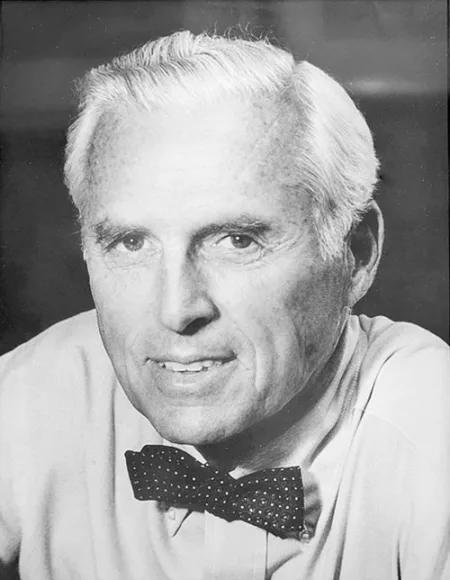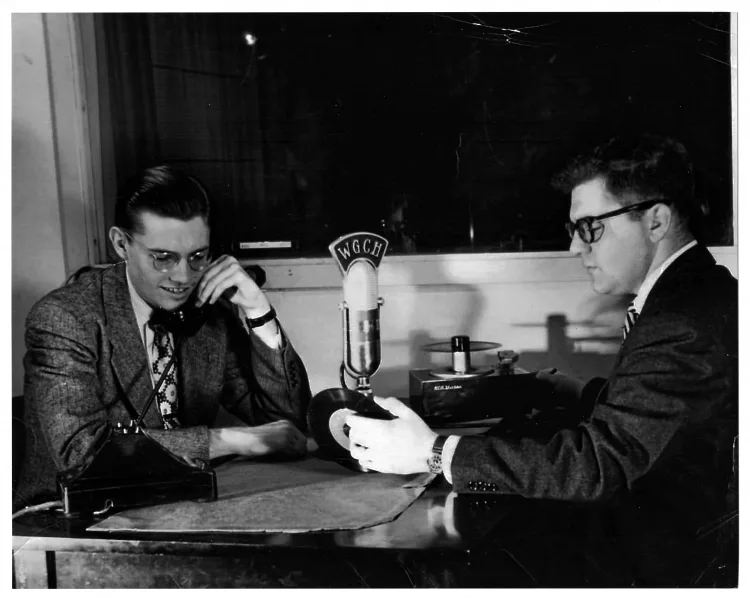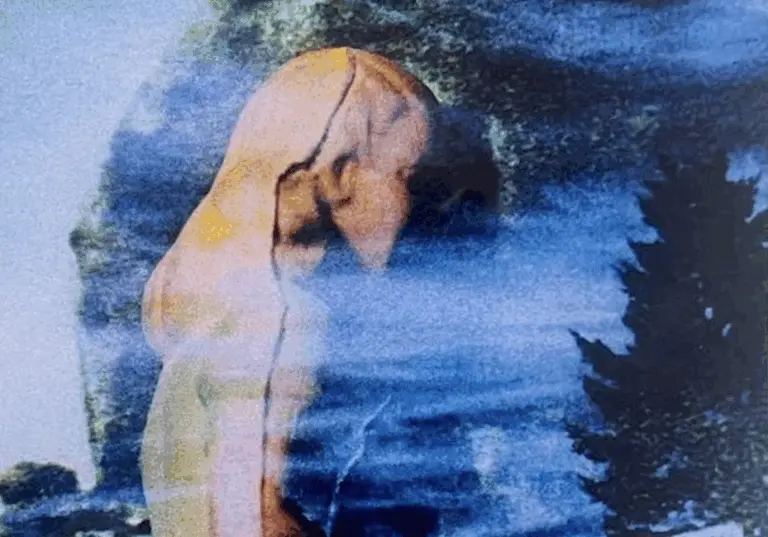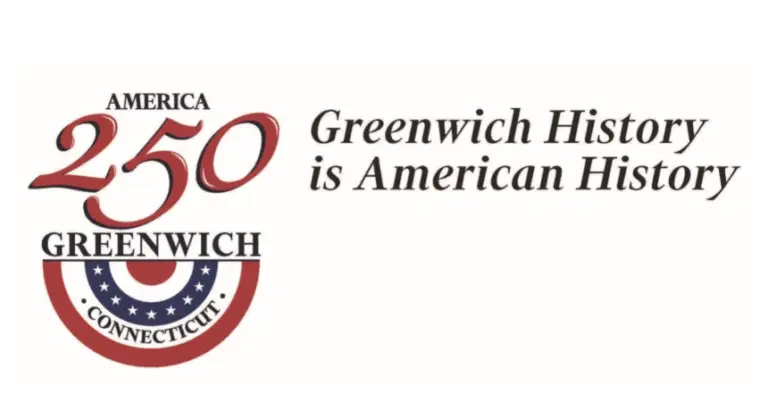Oral History Project 1974-2025: WGCH – A Community Radio Station
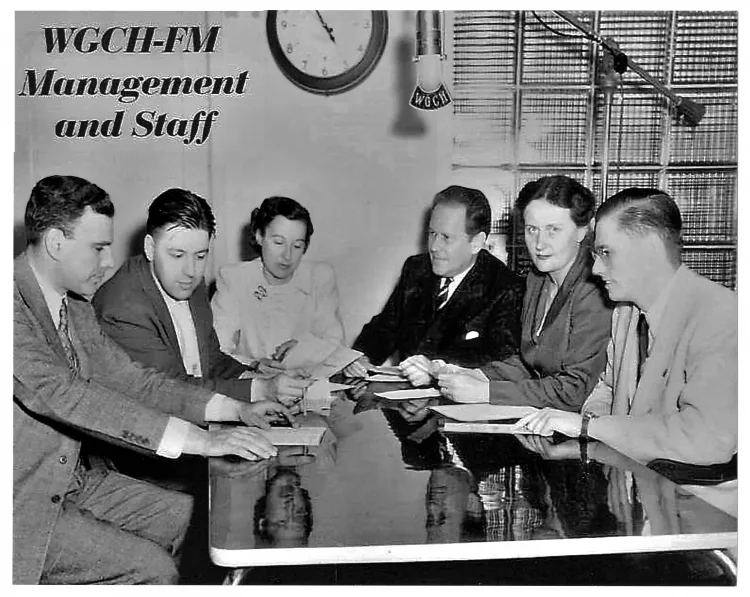
Mary A. Jacobson
“Radio is still a miracle to me. It was in the 1920’s when I walked three miles to listen to Jack Dempsey try to knock out Gene Tunney unsuccessfully (for the title of world heavy-weight champion) or listen to Babe Ruth hit one out. And it’s still a miracle.”
George Cooke Stevens, general manager of the Greenwich Broadcasting Corporation which owned WGCH at the time, spoke to Oral History Project volunteer Arthur Holch in 1976. His pride and excitement in heading a community radio station was palpable in his interview. Now, close to fifty years later, his words still speak to the relevance and continuing role WGCH plays in the community of Greenwich.
The first broadcast of WGCH 1490 AM was on September 15, 1964. It had taken the Federal Communications Commission (FCC) almost twenty years to approve the AM license to broadcast from its initial application. Initially, WGCH was an FM station. “I don’t think too many people remember WGCH–FM, which started in 1949… After three or four years, it was an uneconomic venture…The FM failed only because there simply weren’t enough FM sets around. FM all over the country were going dark and channels were being abandoned.” AM stations were also concerned about television and were fearful of being put out of business. Stevens continued, “I was at NBC at the time…Television was looming as a huge threat to radio audiences.”
Walter Lemmon founded Greenwich FM station in 1949 and held the position of head of the Greenwich Broadcasting Corporation. He remained in that position when the AM license was granted in 1964 and died in 1967. Lemmon “was a naval communications officer… a pioneer in international short-wave broadcasting…a man of very strong character, of great determination. Extremely knowledgeable in all technical matters.” When Stevens first met Lemmon, “we seemed to hit it off from the beginning…He felt I could be of some assistance in helping the new fledgling WGCH 1490 AM. And, of course, I was interested.”
To help listeners remember the call numbers of the station, the Greenwich Post Office was persuaded to change the original postal address of WGCH 1490 to 1490 Dayton Avenue. The Post Office box number “is Box 1490 and our telephone number is 869-1490. We felt it would help impress on the consciousness of the community the 1490 numbers.”
So, why a community radio station? In the age before Google, Facebook, Instagram, YouTube, and so forth, it was a way “to establish a degree of news and information for people in this area which they can’t find anywhere else…So, we’re constantly looking for new ways to give people reasons to tune into WGCH, but intentionally to be a community-oriented station, locally based, and giving service to the people who live nearby.
When there’s an emergency like the big power blackout of three or four years ago, then the whole town looks to a station like WGCH to serve as the heart of its communication system…We simply turn over the station to kind of a total community service role in emergencies like that.” Another way in which WGCH judged its effectiveness in those days, was its ability “to open up the airwaves to callers and let the community establish a total community dialogue…People on the street…can listen to the radio and find out really what’s going on in the whole town and the degree of the problem.”
Parents of yore may well remember telephone chains to alert one another of school closings or delays. They could also listen to the radio to learn this news. Despite the special codes established by the radio station to thwart false information, occasionally a school closing was fatuously reported by a student. “I think it was Father Gay of Saint Mary’s High School who had just driven down through heavy snows from Danbury in order to get here for opening of school. Few people were there…We learn from experience.”
WGCH was proud of its commitment to broadcast meetings of importance to the community. “We’ve carried every town meeting live, start to finish. We carry all of the Board of Education meetings live, start to finish. We carry all Board of Estimate meetings live, in their entirety, as well as many special Planning and Zoning hearings…Then we follow that up with numerous forums and discussions. We have ‘The Open Line.’”
In addition to its focus on local news, Stevens cited the importance of national and world reports. “In fact, on some days I dare say we give our audience more national and world news on the hour than the networks do in New York, with the exception of the all-news stations like CBS and WINS.” Of the staff who worked at WGCH, Stevens cited Bill Coddaire (“our morning man”); Burt Steere (morning news); John Gentri (call-in programs); Marge Staples and Elizabeth Karp (interviews); Neil MacMillan (program manager); Fran Donald (library news); Grace Mackall (gardening expertise); George Barber and Earl Price (big bands and classical music), among others. At one point, four hundred high school students signed a petition requesting more rock music. “We’ve talked to them about putting some more on late nights. They claim they study better with this in the background.”
In conclusion, Stevens said, “Well, I think it (WGCH) has an identity.” One of its listeners summed it up for him. “He said, ‘There’s something that’s different about this station outside of the fact that it’s obviously a local station. Your station is more human.’” Stevens proudly reflected on that observation. “I naturally was pleased by that. If we’re going to get a label, I’d be happy to settle for that one.”
The interview “WGCH: A Community Radio Station” may be read in its entirety or checked out at the main library. It is also available for purchase by contacting the OHP office. The OHP is sponsored by the Friends of Greenwich Library. Visit the website at glohistory.org. Our narrator’s recollections are personal and have not been subjected to factual scrutiny. Mary Jacobson serves as blog editor.
